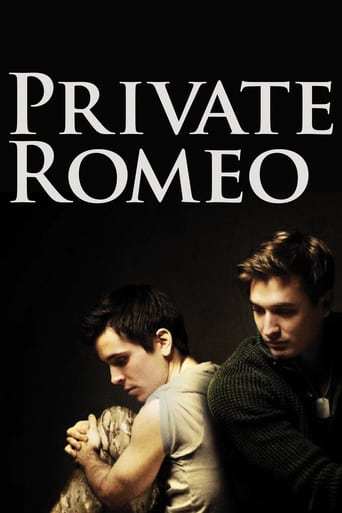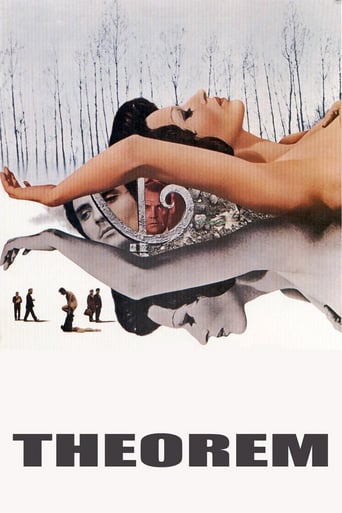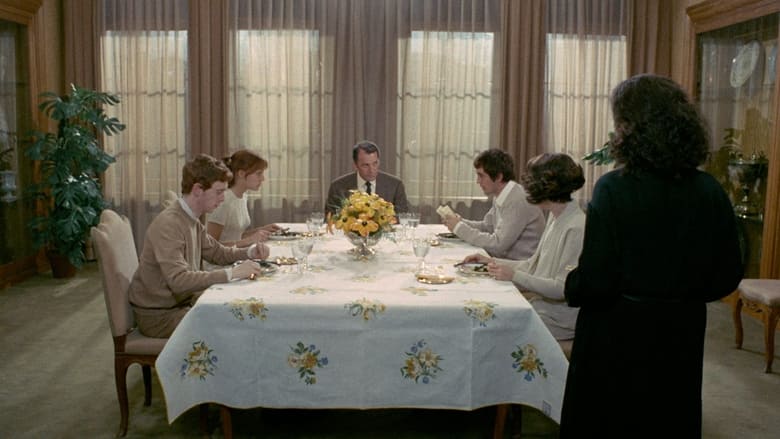Theorem (1969)
A wealthy Italian household is turned upside down when a handsome stranger arrives, seduces every family member and then disappears. Each has an epiphany of sorts, but none can figure out who the seductive visitor was or why he came.
Watch Trailer
Cast
Similar titles

Reviews
Sadly Over-hyped
A film with more than the usual spoiler issues. Talking about it in any detail feels akin to handing you a gift-wrapped present and saying, "I hope you like it -- It's a thriller about a diabolical secret experiment."
It’s not bad or unwatchable but despite the amplitude of the spectacle, the end result is underwhelming.
All of these films share one commonality, that being a kind of emotional center that humanizes a cast of monsters.
The bourgeoisie have long been a target for many of the great European film-makers. They were an object of fascination and humour for Luis Bunuel and were often portrayed as outwardly repulsive by Rainer Werner Fassbinder and Jean-Luc Godard. In Theorem, Pier Paolo Pasolini ponders whether they are beyond hope and redemption, so far removed from our society that they are now of a different species altogether. The film begins outside of a factory, where the workers gather outside trying to understand why the owner has fled, leaving the entire company in the hands of its employees. They seem angry while a news reporter tries to comprehend the situation.In an upper-class Milan suburb, a wealthy family are informed of the imminent arrival of a stranger by a enthusiastic postman. The man, known only as the Visitor (Terence Stamp), suddenly appears at their home seemingly without reason, and immediately begins to affect the family and their maid. He stops the maid (Laura Betti) from committing suicide, soothes the son (Andres Jose Cruz Soblette) of his anxieties, eases the fears of the opposite sex of the daughter (Anne Wiazemsky), seduces the sexually repressed mother (Silvana Mangano), and nurses the seriously ill father (Massimo Girotti) back to health. He vanishes as quickly as he appeared, leaving his subjects in various states of bewilderment and enlightenment.Is the man God, the devil, or both? Ultimately, this question doesn't really matter. It's clear that the Stranger is a divine presence, but it's the effect he has on the unwitting family that is the most fascinating. The maid, a humble woman of low birth, returns to her village and is worshipped as a saint, and even appears to levitate at one point. The bourgeoisie family, however, start to slowly implode, climaxing with the father stripping himself naked and wandering into a desolate land. The Visitor seems to unlock their potential, only they - the maid aside - are unable to handle such divinity brought to them on a human level. The final scene includes a scream that may be ecstasy or pure terror, but Theorem doesn't make it that easy to unravel. This is a complex and fascinating work by one of the Italian masters, and one that will have you trying to pull apart its themes days after you have watched it.
Ranks alongside his "Gospel According to St Mathew." I saw several metaphorical links in "Theorem" to Fellini's "Nights of Cabiria," a film scripted by Pasolini; the contribution of Pasolini to the lovely Fellini film is often overlooked.The allusion to the Terrence Stamp character as Christ is not difficult to pick up. The political context is also more than obvious. "Theorem" encapsulates all of Pasolini's genius evident elsewhere, in one work.Here's a Pier Paolo Pasolini film that's different--he uses good looking established actors unlike his other works where he would pick actors unknown and less attractive. In "Theorem" the good looking characters are contrasted with the ugly, non-professional actors intentionally.The film might appear overtly to be about sex but Pasolini's canvas captures a lot more than the obvious. Brilliant casting. Mozart's "Requiem" rendered by the Russian Academy Choir is transcendental. Morricone's use of wind instruments is so different here but captures the mood of loneliness. Terrence Stamp is the eye candy of the film, just as he was in "Far from the Madding Crowd". All three ladies: Sylvano Mangano, Laura Betti and former Mrs Jean Luc Godard (Ann Wiazemsky) give more than interesting performances--each body movement tells you so much. Words are rarely required to communicate in "Theorem"; visuals and music do more in that department.
Someone said you should look at your mood before rating this film. I had to walk an unnecessary kilometre to buy my ticket, someone was using a cellphone during the credits, and the WHOLE film was shown in a too-wide aspect ratio - after I had alerted the organisers, having seen the problem while watching the splash-page, over and over. (It was shown rather dimly off a DVD.) So I have to give the film a huge discount for my grumpiness.I didn't like it. I don't despise it, because I think Pasolini was sincere in making it, not trying to put one over us with pretentious piffle (cf Fellini). It's certainly not the worst film ever made, not dishonest, condescending or manipulative, just slow, opaque and uninvolving (but maybe the last is just me; see above).My (and most people's?) disconnect from Teorema is that we can no longer identify with the Italian Catholic guilt that overcame most of the family after succumbing to Terence Stamp's undoubted charms. He had sex with them (usually at their instigation - to say "he seduced them" is to exaggerate wildly) and a reaction is to be expected, but catatonia? Levitation and autointerment? Bad art? (OK, bad art.) And is there really a volcanic desert handy to the Milan (?) railway station that anyone can walk to naked without being intercepted?So when it (finally!) said "FINE" I said "Fine by me."
"There are only 923 words spoken in "Teorema" - but it says everything!", brags the tagline. It makes some sense, since Pasolini's film feels like a rhythmic visual poem with scattered dialogue. "Teorema" looks and feels like a haunting silent film integrated with sparse dialogue - failed attempts of communication and change among the characters.A beautiful and enigmatic visitor (a young Terence Stamp, one of the intriguing, almost androgynous cult sex figures of the 60's, along the lines of a Udo Kier and others) seduces and then leaves each member of a bourgeois family. The father (Massimo Girotti, of Visconti's "Ossessione"), the mother (Silvana Mangano, "Death in Venice"), the daughter (Anne Wiazemsky, of Bresson's "Au Hasard Balthazar" and Godard's then wife), the son (Andrés José Cruz Soublette) and even the housemaid (Laura Betti, best actress at the Venice Film Festival for this performance) are all altered by the visitor's sexual presence in their lives, and each will try to find salvation or catharsis once they're abandoned. Their ways can be seen as an allegory of the fears and misconceptions of those trapped in their own conventions, and the tragic consequences of their failed attempts to get away - after the visitor, an hedonistic angel of death, tricked them with false hopes of sexual and emotional liberation. At least, that's how I see it - which I wouldn't dare to claim as an ultimate view on it. As enigmatic and haunting the images in "Teorema" are, they ask for repeated viewings. And just the fact that they give you enough interest for a second look, it's quite a feat. An interesting, cerebral cinematic exercise, to say the least. 8.5/10.










